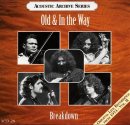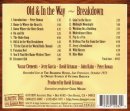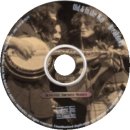BreakdownOld and In The WayInitial release : 1997Acoustic Disc ACD 28 Acoustic Archive Series
Original Live Recordings From 1973 - Vol. 2 The second of two archive releases of live Old And In The Way from 1973.
Tracks
- Introduction by Peter Rowan
- Home Is Where The Heart Is (Gately / Talley)
- Down Where The River Bends (Anglin / Peck / Wright)
- On and On (Monroe)
- Hobo Song (Bonus)
- Old & In The Way Breakdown (Garcia)
- 'Til the End of the World Rolls Around (Thomas)
- Panama Red (Rowan)
- You'll Find Her Name Written There (Hensley)
- Kissimee Kid (Clements)
- Goin' To The Races (Stanley)
- Midnight Moonlight (Rowan)
- Working On The Building (Traditional)
- Mule Skinner Blues (Rodgers / Vaughn)
- Pig in a Pen (Traditional)
- Drifting Too Far From The Shore (Moody)
- Jerry's Breakdown (Garcia)
- Wild Horses (Jagger / Richard)
- Blue Mule (Rowan)
- Catfish John (McDill / Reynolds) - Hidden track
Musicians
- Jerry Garcia - banjo, vocals
- David Grisman - mandolin, vocals
- Peter Rowan - guitar, vocals
- Vassar Clements - fiddle
- John Kahn - acoustic bass
Credits
- Producer - David Grisman
- Executive Producer - Craig Miller
- Recording engineers - Owsley Stanley and Vickie Babcock
- Liner Notes- Neil V. Rosenberg
- Principal photography - Roberto Rabanne
- Additional photography - Nobuharu Komoriya, Robert Minkin, Greg Mudd, Gary Nichols
- Mastering - Paul Stubblebine
- Design & layout - D. Brent Hauseman
- Recorded live at the Boarding House, San Francisco October 1 and 8, 1973.
- The project is dedicated to Spud Boy and Mule (Jerry Garcia and John Kahn)
Notes
Our thanks go to Neil V. Rosenberg and Acoustic Discs who have given permission to reprint Neil's song notes from the Breakdown CD booklet.
- Introduction No notes.
- Home Is Where The Heart Is. Only in bluegrass does one so often hear sentimental songs performed at breakneck speed. Written by Connie Gately, this song was first released on Starday Records in 1961 by a group called Connie And Joe. Active from the late '40s into the '80s, this little known Tennessee band, fronted by guitarist and lead singer Gately and banjoist Joe Drumwright, had recorded in 1952 as Connie And Babe for the Republic label and later made three albums for Rounder. On this high-energy version, David sings lead; on the choruses Peter adds tenor harmony above, and Jerry a baritone part below. David recorded it in 1988 as the title cut of his all-star bluegrass double album.
- Down Where The River Bends. This love song was written during World War II by Jim Anglin for his brother Jack, of the country duo Johnny and Jack, who never recorded it but performed it. They sold it to Grand Old Opry star Roy Acuff, who passed it on to the Bailes Brothers. Their Columbia recording was never released, but through their performances yet another, The Bailey Brothers, added it to their repertoire. When Red Allen teamed up with the Osborne Brothers in the '50s, they too sang the song (the Osbornes had worked with Charlie Bailey of the Bailey Brothers in 1955). It wasn't issued on record until 1965, when both Allen and The Country Gentlemen included it on albums. Peter sings the verses; on the choruses he moves to tenor, David sings lead and Jerry renders the baritone. The fancy trio ending is influenced by Red Allen, with whom David worked in the mid-'60s. Red sang it with David and Herb Pederson on Bluegrass Reunion (Acoustic Disc ACD-4), his last recording.
- On And On. Bill Monroe wrote this song and recorded it as a trio in 1954; it was released as a single in 1956. This was one of the only vocal trios that Monroe regularly featured in concert. According to Monroe's biographer, Ralph Rinzler, it's text is autobiographical. For musicians like Jerry, David and Peter, who discovered bluegrass in the '60s and heard Monroe's frequent performances of it, this song was a vehicle for learning how to sing bluegrass trios. Jerry sings lead, David the baritone and Peter the tenor. In 1975 David recorded a version of this song on his first album.
- The Hobo Song. This infectious tune was penned by Jack Bonus, a singer-songwriter who played sax with Earth Opera, the rock band that David and Peter formed in 1967. Another rendition can be heard on Old And In The Way. Peter sings the verses, switching to tenor on the chorus while Jerry sings lead below and David sings high baritone above.
- Old And In The Way Breakdown. Jerry wrote the modal tune on the banjo; with it's 1-7-1 chord progression, a favorite with bluegrass composers, it resembles the venerable traditional fiddle tune "Paddy On The Turnpike." Indeed, Vassar's and David's solos both quote phrases from that old-time standard. This performance closes with a tight duet between banjo and mandolin.
- 'Til The End Of The World Rolls 'Round. Recorded and released in 1954 as a single by Lester Flatt, Earl Scruggs and The Foggy Mountain Boys, this is another one of David's favorite bluegrass tongue-twisters. He included it on his Rounder album in 1975; the Flatt and Scruggs version didn't appear on LP until 1977. David sings lead and Peter sings tenor.
- Panama Red. Peter Rowan's classic became the title song for an album by The New Riders Of The Purple Sage. This group was an early vehicle for Jerry's pedal steel playing and was fronted by his old Black Mountain Boys partner David Nelson. An alternate version of this song about being high but not lonesome appeared on the first Old And In The Way album. Peter leads the verses; on the choruses he sings tenor harmony above David's lead.
- You'll Find Her Name Written There. Charlie Monroe, Bill's older brother and partner in the Monroe Brothers (1934-1938), first recorded this haunting melody on RCA Victor in 1951. Bill's 1954 Decca recording, released as a single in 1957, didn't appear on LP until 1971 but was quite familiar to bluegrass audiences. Old And In The Way's unusual trio (Peter, lead; Jerry, baritone; David, tenor) recalls the twin fiddle harmonies of Bill's version, and duplicates his modulation on the third verse. This arrangement was worked up spontaneously and performed only once. David recorded it instrumentally on his first album in 1975.
- Kissimee Kid. Vassar's fiddle masterpiece, named after his home place in Florida, appears in another version on Old And In The Way. According to Vassar, both Jerry and David influenced this arrangement which differs from the one he played with Dickey Betts of the Allman Brothers Band at around the same time.
- Goin' To The Races. Carter Stanley of The Stanley Brothers wrote these words to the tune of "Let Her Go, God Bless Her," recorded in the late '30s by Mainer's Mountaineers. The Stanleys never recorded it in the studio. In 1957 Carter Stanley 'gave' the song to the newly-formed Country Gentlemen, who released it on their first single. In February, 1973, Peter and David, with Richard Greene, Clarence White and Bill Keith, played the song on a TV special. Later that year this bluegrass supergroup recorded an album, Muleskinner, with John on bass. The vocal parts are the same as on Down Where The River Bends.
- Midnight Moonlight. One of Peter's most requested songs, this alternate take is more like rock than bluegrass in the way it's first two verses and choruses are not separated by instrumental breaks, but are followed by an extended jam in which banjo, fiddle, mandolin and then banjo improvise on a two-chord structure. The vocal arrangement is similar to You'll Find Her Name Written There. Peter also recorded this song with his brothers Chris and Lorin and on a Flying Fish album, and Jerry often performed it with John in the Jerry Garcia Band.
- Working On A Building. Bill Monroe recorded this gospel song, with origins in African American spiritual traditions, for Decca in 1954 on the same day he cut On And On. He credited to The Carter Family, who first recorded it in 1934. Old And In The Way's version is similar to Monroe's but the words to the third verse, "If I was a dealer...," are unique to them. David sings the high lead on the verses and moves up to tenor harmony on the quartet choruses, where Peter joins on lead, Jerry on baritone and Vassar sings bass.
- Muleskinner Blues. In 1939 Bill Monroe refashioned Jimmie Rodgers' popular "'blue yodel" of a decade earlier into his definitive statement of bluegrass as modern old-time music: "It's speeded up, and we moved it up to fit the fiddle and we have that straight time to it, driving time." It was Bill's first hit on The Grand Old Opry, and he recorded it several times , including the classic 1950 Decca version with a young Vassar Clements playing fiddle. Peter also sang it with Muleskinner. Here Vassar's fiddle shines, both in breaks and backup; and David takes a mandolin break, something Monroe didn't usually do on this song.
- Pig In A Pen. Composed by Grand Old Opry fiddler Arthur Smith, who recorded it with the Delmore Brothers in 1937, this song quickly became a favorite with old-time musicians, garnering added verses from the old mountain lyric song traditions. This version by Old And In The Way (another version can be found on their first album) owes much to the Stanley Brothers' early '60s recording. Jerry sings the same verses as Carter Stanly, which are different from those sung by Smith. The trio parts are the same as those on The Hobo Song.
- Drifting To Far From The Shore. Charles E. Moody, the Georgia composer who was also a member of a frequently recorded string band of the '20s, The Georgia Yellow Hammers, wrote this in 1923. It was published in a popular Stamps-Baxter's gospel songbook which is probably where The Monroe Brothers learned it. They recorded it at their first session for Bluebird in 1936, and it was popular enough for Roy Acuff to do a cover recording in 1939. It was given renewed popularity in bluegrass when The Country Gentlemen included it on their first Folkways album in 1960. The vocal parts are the same as on You'll Find Her Name Written There.
- Jerry's Breakdown. This banjo tune, written by Jerry for the band, is heard here for the first time. It's distinct three parts, with varied chord changes, are influenced by the quot;melodic" banjo style of Bill Keith, who revolutionized bluegrass banjo picking with the instrumentals Salt Creek, Santa Claus and Sailor's Hornpipe that he recorded with Bill Monroe in 1963. Keith was also a pickin' partner of both Peter's and David's and worked with them in Muleskinner.
- Wild Horses. This Rolling Stones composition from Sticky Fingers was included on the first Old And In The Way album and, from there, has joined a number of other rock originals (like Manfred Mann's Fox On The Run and the Grateful Dead's Friend Of The Devil) in the communal bluegrass repertoire. The vocal parts are the same as those on Drifting To Far From The Shore.
- Blue Mule. Peter's down-home fantasy with tall-tale imagery is a new legend built on an old one - Bill Monroe's Molly And Tenbrooks. The Kentucky ballad is about a horse race that took place on July 4, 1878 at Louisville between the Kentucky thoroughbred Ten Broeck and the California-owned Miss Mollie McCarthy. In this song both horses are defeated by Peter's out-of-sight Blue Mule. It also appears on the Muleskinner project. The vocal parts are, appropriately, the same as those on Wild Horses.
Neil V. Rosenberg
Memorial University of Newfoundland
St. John's, Newfoundland
September 14, 1997
Related releases
Home Is Where The Heart Is and Pig In A Pen were included on the Acoustic Disc sampler;
The Introduction and Pig in a Pen were subsequently included on;
Drifting Too Far From The Shore was included on the Acoustic Disc sampler;
|
Buy from Acoustic Disc
Buy from amazon.com


|
 tracks
tracks
 musicians
musicians
 credits
credits
 notes
notes
 related releases
related releases
 tracks
tracks
 musicians
musicians
 credits
credits
 notes
notes
 related releases
related releases